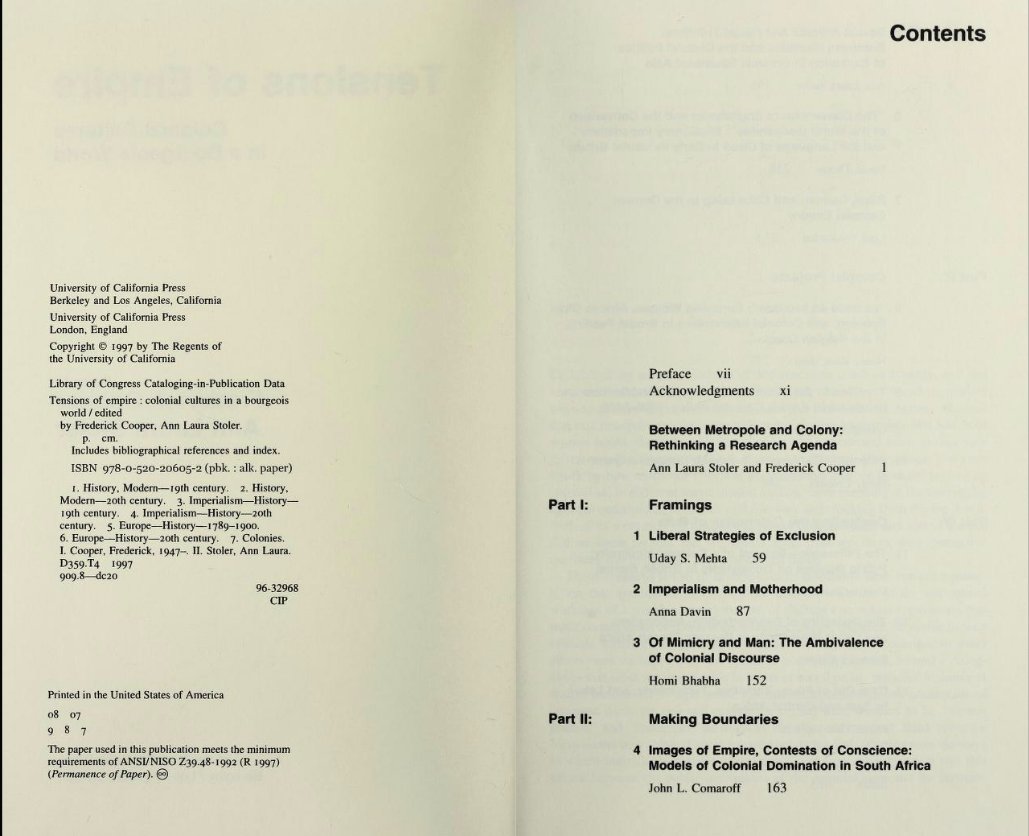
Tensions of empire- colonial cultures in a bourgeois world-Cooper, Frederick, 1947- Stoler, Ann Laura-1997 -- MNC does not hold a monopoly on the word Metis, it is an International phenomena. With many many different definitions. 
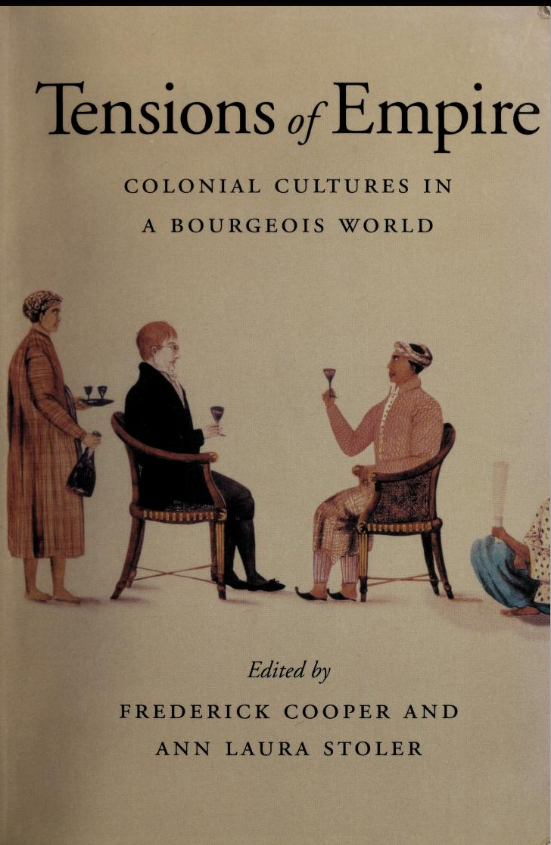
Tensions of empire- colonial cultures in a bourgeois world-Cooper, Frederick, 1947- Stoler, Ann Laura-1997- how a person was labeled could determine that a certain category of persons could be killed or raped with impunity, but not others. It could open or close down the 
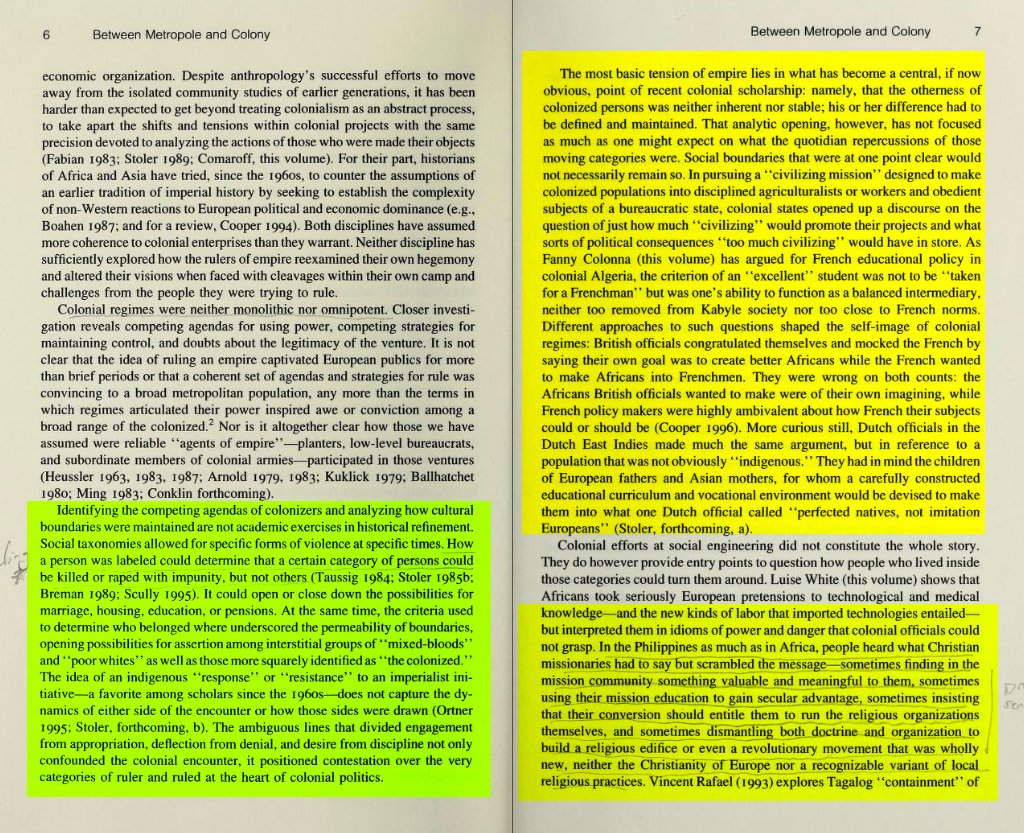
possibilities for marriage, housing, education, or pensions. At the same time the criteria used to determine who belonged where underscored the permeability of boundaries, opening possibilities for assertion among interstitial groups of "mixed-bloods" and "poor whites" as well as
those more squarely identified as "the colonized."
The idea of an Indigenous "response" or "resistance" to an imperialist initiative, a favorite among scholars since the 60s does not capture the dynamics of either side of the encounter or how those sides were drawn.
The idea of an Indigenous "response" or "resistance" to an imperialist initiative, a favorite among scholars since the 60s does not capture the dynamics of either side of the encounter or how those sides were drawn.
Acadie and the Acadians-by Roth, D. Luther- 1891-Marie D'Entremont- there was another D'Entremont marriage-it was opposed by the husband's family, the Du Viviers and by his superior officers. (Marriage was annulled because she was a Metisse) 
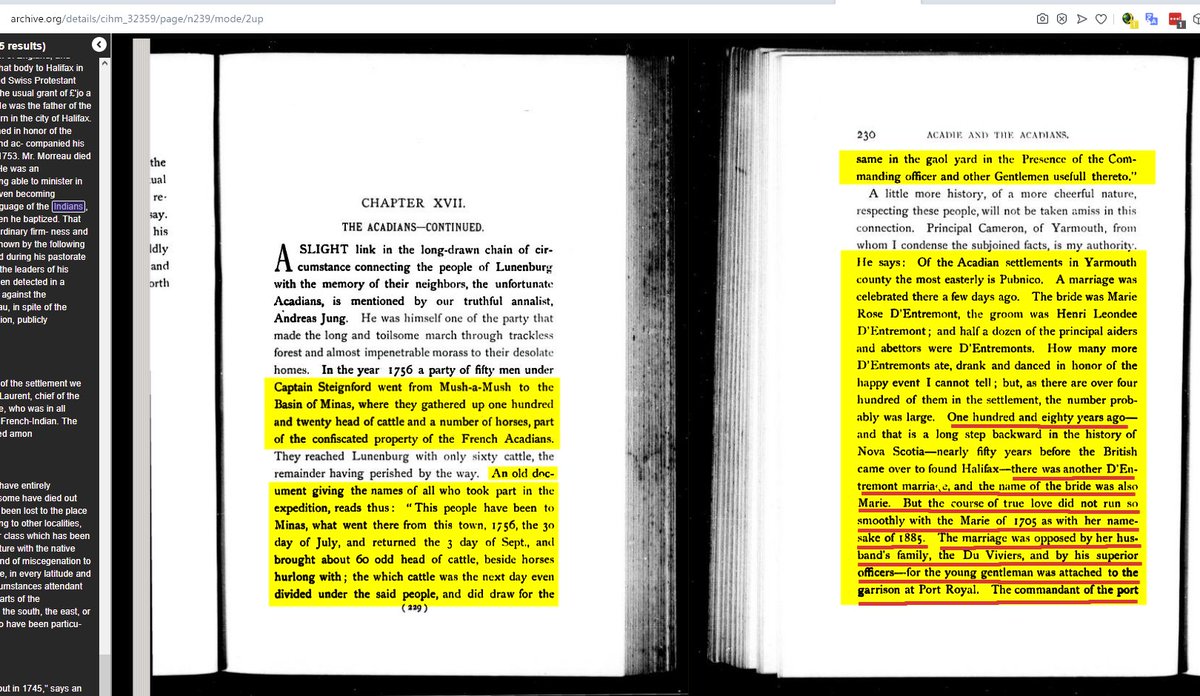
A history of Port Royal-Annapolis Royal, 1605-1800- by Dunn, Brenda - 2004 - Marie- Mius d'Entremont - Francois Du Pont Duvuver - marriage against the wishes of the acting governor. 

Unequal transitions-Two Metis women in the Eighteenth Century Ile Royale - Anne Marie Lane Jonah - french colonial history vol11-2010-pp109-129 - Michigan State University Press- pg122- Marguerite Guedry - documents spoke of sauvagesse and demi-sauvagesse. 

Unequal transitions-Two Metis women in the Eighteenth Century Ile Royale - Anne Marie Lane Jonah - French colonial history vol11-2010-pp109-129 - Michigan State University Press- pg 120-Marguerites mother - Anne Mius d'Entremont-mixed heritage-document calls her a Sauvagesse and 

an Acadian in the same sentence. Marguerite did not appear before the counsil to hear their ruling on the breaking of her marriage and the declaration of any children therof would be bastards. :(
Tensions of empire-colonial cultures in a bourgeois world-Cooper, Frederick, 1947-Stoler, Ann Laura-1997- colonial states were often in the business of defining an order of things according to untenable principles that they themselves undermined their ability to rule.
Hybridity's
Hybridity's

of richly varied sorts existed not only in the French and Spanish Carribean but in more starkly binary racial contexts. As early as 1848, Dutch authorities
in the Indies worried openly that creole whites saw themselves as "world citizens" rather than
as partisans of a
in the Indies worried openly that creole whites saw themselves as "world citizens" rather than
as partisans of a
Netherlands homeland and Dutch rule.
Tensions of empire- colonial cultures in a bourgeois world-Cooper, Frederick, 1947- Stoler, Ann Laura-1997- Racial thinking was an organizing principle and a powerful rhetorical theme. (Hmm where else do we keep hearing rhetorical thoughts) 

Tensions of empire- colonial cultures in a bourgeois world-Cooper, Frederick, 1947- Stoler, Ann Laura-1997- French colonial advisor for Indochina - Chailley-Bert- sought to devise a policy towards the metis populationin Indochina, he traveled to Batavia to study what he saw as a 

successful policy toward the Indo-European population in the Dutch East Indies; he did not seek his advice from France. Dutch officials trying to turn a directly coerced indentured labor force into a self-reproducing workforce linked labor issues to family organizations in ways
that were to echo different rhythms across colonial empires- Focus on family formation as a strategy to stabilize reproduction and overt subversion in Deli. State interventions into labor and family point to further questions- Whether other such incursions into the realm of the
social by medical doctors, by educators, by agricultural specialists were chronologically linked to each other and whether the divisions of knowledge within which each intervention took place were subsets of larger effort.
Tensions of empire- colonial cultures in a bourgeois world-Cooper, Frederick, 1947- Stoler, Ann Laura-1997- European identities and cultural politics of exclusion in Colonial Southeast Asia - Metissage - interracial unions and the sort of progeny to which it gave rise-referred to 

as metis, mixed-bloods) in French Indochina at the turn of the century. It is a story with multiple versions about people whose cultural sensibilities, physical being and political sentiments called into question the distinctions of difference that maintained the neat boundaries
of colonial rule. French Indochina was a colony of commerce occupied by the military in the 1860s and settled by colons in the 1870s with a metis population that numbered no more than several hundred by the turn of the century. The Netherlands Indies, by contrast, had been
settled since the early 1600s with those of mixed descent on born in the Indies-numbering in the tens of thousands in 1900. They made up nearly three-fourths of those legally designated as European. Their Indische mestizo culture shaped the contours of colonial society for the
first two hundred years. In both Indies and Indochina, with their distinct demographics and internal rhythms, metissage was a focal point of political, legal, and social debate. Conceived as a dangerous source of subversion, it was seen as a threat to white prestige.
Tensions of empire- colonial cultures in a bourgeois world-Cooper, Frederick, 1947- Stoler, Ann Laura-1997- the so called metisproblem in quintessential form- Some metis were candidates for incorporation, but others were categorically denied. In either case, the decision to grant 
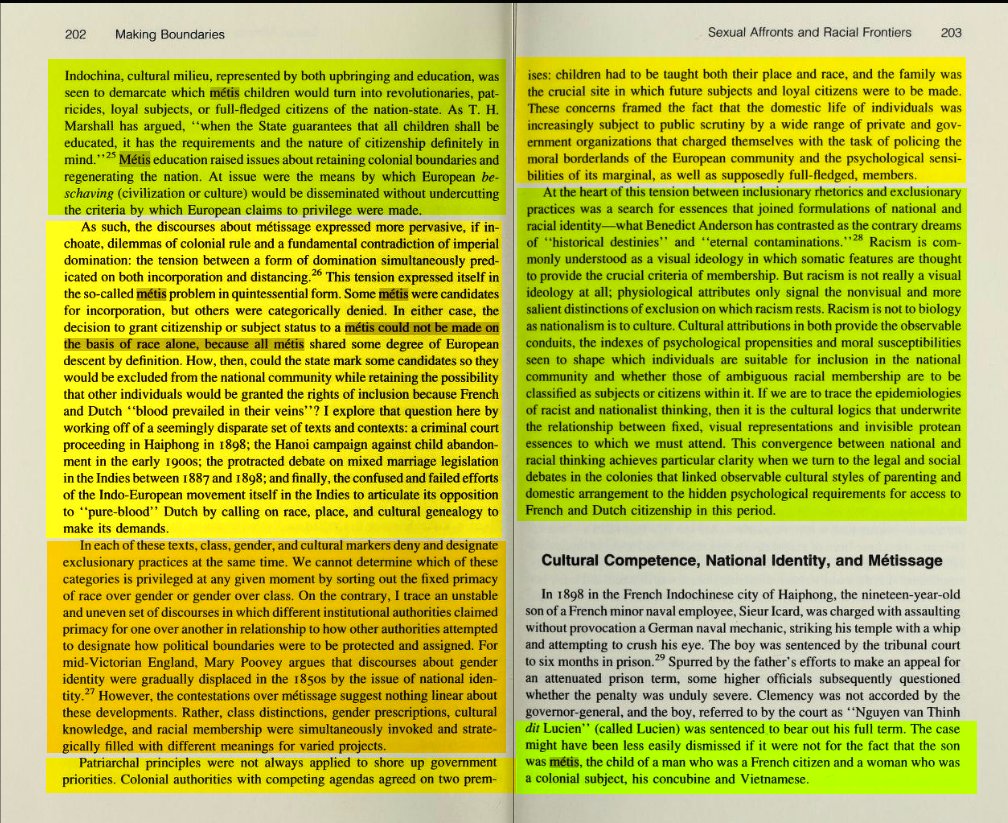
citizenship or subject status to a metis could not be made on the basis of race alone, because all metis shared some degree of European descent by definition. How then, could the state make some candidates so they would be excluded from the national community, while retaining the
possibility that other individuals would be granted the rights of inclusion because French and Dutch "blood prevailed in their veins"? (the confused and failed efforts of the Indo-European movement itself in the Indies to articulate its opposition to "pure-blood" Dutch by calling
on race, place, and cultural genealogy to make its demands.) - The son was metis, the child of a man who was a French citizen and a woman who was a colonial subject, his Vietnamese concubine.
Tensions of empire- colonial cultures in a bourgeois world-Cooper, Frederick, 1947- Stoler, Ann Laura-1997- came up a time when acts of - fraudulent recognition- of native children were said to be swelling the French citizenry with a bastard population of native poor. - The boy 
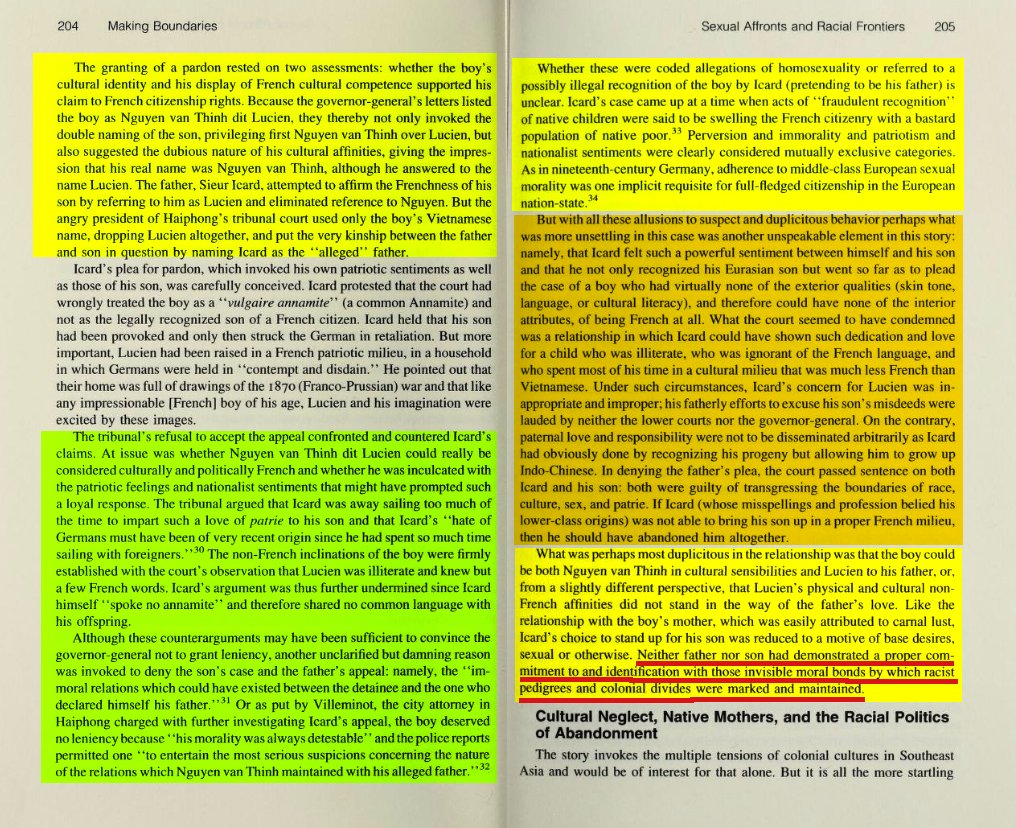
deserved no leniency because "his morality was always detestable" - the metis son. the granting of a pardon rested on two assessments, whether the boy's cultural identity and his display of French cultural competence supported his claim to French citizenship rights. The father
protested, that the court had wrongly treated the boy as a "vulgaire annamite" (a common Annamite) and not as a legally recognized son of a French citizen.
The “Possessed” Girls of Bas-de-Tousquet-An Interpretation of Popular Religious and Cultural Evidence-Colby Gaudet-02 February 2018.- detested caste of mixed people. (Yarmouth, Nova Scotia) 

WOMEN AND ACADIAN POPULAR RELIGIOUS CULTURE IN SOUTHWESTERN NOVA SCOTIA, 1795-1820 - COLBY GAUDET - MARCH 2018 - dispensations sigogne. - Mius and Doucet families from the detested caste of those mixed people. 

Tensions of empire- colonial cultures in a bourgeois world-Cooper, Frederick, 1947-; Stoler, Ann Laura-1997- Between 1901 and 1903 several thousands pages of gov reports outlined the precarious economic conditions and political dangers of a population legally classified as 

European but riddled with impoverished
widows, beggars, vagrants, and abandoned children who were mostly Indo-Europeans. Colonial officials wrestled with the belief that the European-ness of metis children could never be assured, despite a rhetoric affirming that education and
widows, beggars, vagrants, and abandoned children who were mostly Indo-Europeans. Colonial officials wrestled with the belief that the European-ness of metis children could never be assured, despite a rhetoric affirming that education and
upbringing were transformative processes.
Tensions of empire- colonial cultures in a bourgeois world-Cooper, Frederick, 1947-; Stoler, Ann Laura-1997- option of making metis a legal category was actively debated in international colonial forums through the 30s,but was rejected on explicitly political grounds. French 

jurists persuasively argued that such a legal segregation would infect the colonies with a destructive virus, with a class of "deracine, declasse," "our most dangerous enemies", "insurgents, irreconcilable enemies of our domination" The legal rejection in no way diminished the
concern about them. On the contrary, it produced an intensified discourse in which racial thinking remained the bedrock on which cultural markers of difference were honed and more carefully defined. There was nowhere clearer than in the legal discussion about whether and what
criteria, children of unknown parents should be assigned French or native nationality. Under a 1928 decret, all persons born in Indochina (That is on French soil) of unknown parents of which one was presumed to be French could obtain recognition of "la qualite de francais"
Presumed French-ness rested on two sorts of certainty; the evaluation of a child's "physical features or race" by a medico-legal expert" and a "moral certainty" derived from the fact that the child "has a French name, lived in a European milieu and was considered by all as being
of French descent." Thus French citizenship was not open to all metis but restricted by a "scientific" and moral judgement that the child was decidedly non-indigene. Inclusionary laws left ample room for an implementation based on exclusionary principles and practices.
Tensions of empire- colonial cultures in a bourgeois world-Cooper, Frederick, 1947-; Stoler, Ann Laura-1997- Between 1898 and 1903 various Indisch groups rose, fell, and reassembled as they each sought viable programs to promote the "uplifting" of the Indo-European poor without 

linking their own fate to them. To do so they resorted to principles or racial hierarchy that accorded those of a certain upbringing, sexual morality, and cultural sensibility a right to privilege and to rule. What underwrites this common discourse is a new collusion between race
and culture: As race dropped out of certain legal discriminations, it re-emerged marked out by specific cultural criteria in other domains. The contemporary discourse on the new racism in Europe situates "cultural racism" as a relatively recent and nuanced phenomenon, replacing
the physiological distinctions on which earlier racisms had so strongly relied. The "novelty" of the new racism is often located in its strong cultural inflection, embedded in wider structures of domination, based in the family, and tied to nationalist sentiments in ways that
make it more relevant to a wider constituency and therefore more pervasive and insidious to weed out. (Woahhh sounds like the MNC's handbook to me !!)
@threadreaderapp unroll
• • •
Missing some Tweet in this thread? You can try to
force a refresh
